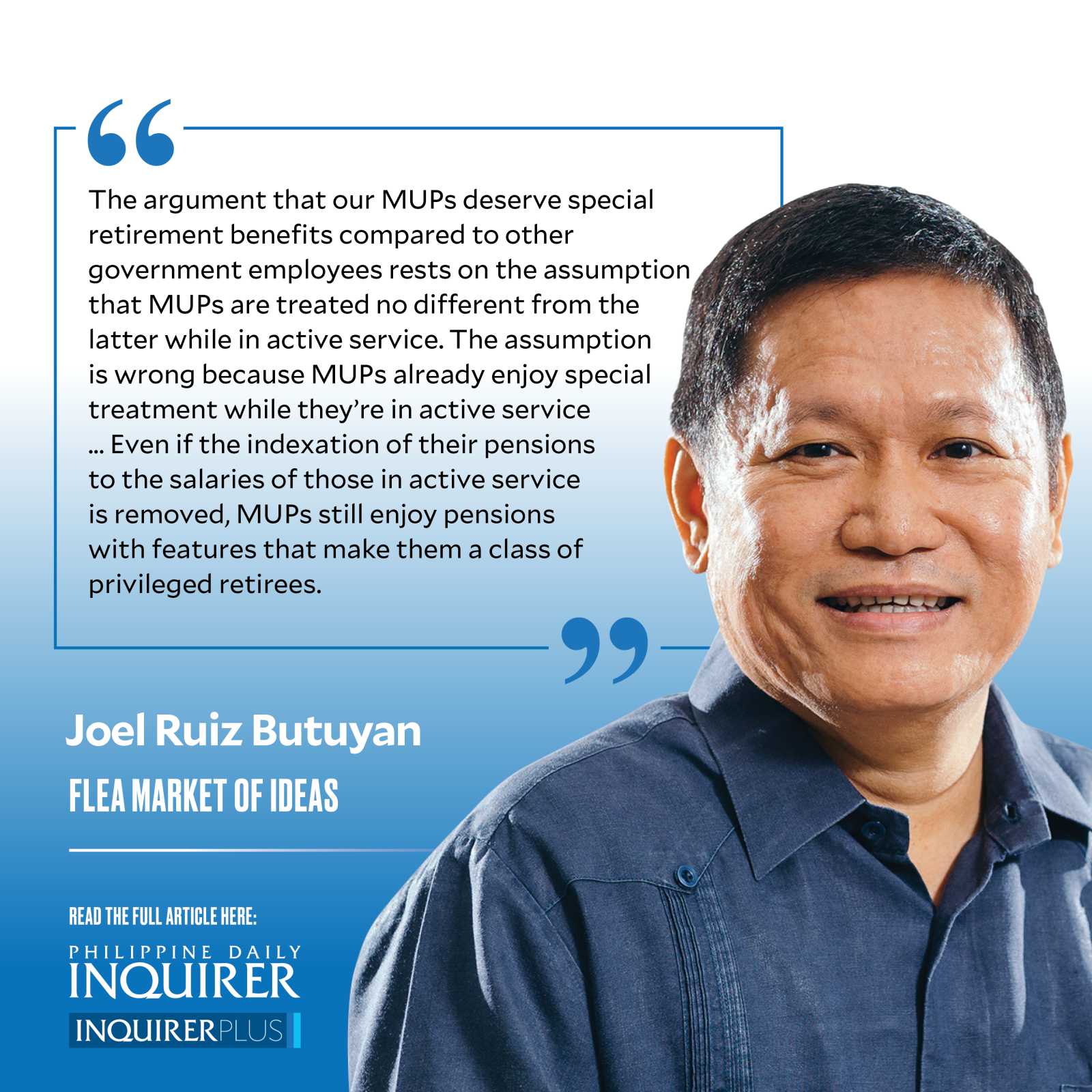Uniformed personnel and their fat pensions

In the ongoing debate regarding the special pension privileges enjoyed by our military and uniformed personnel (MUP), the defense consistently invoked is that our security personnel deserve higher retirement pay because they offer their lives in defense of country. Instead of reducing MUP pension benefits, the solution lies in reducing massive government corruption, goes another defense refrain. With due respect, these arguments fail to erase issues of unfairness and unlawfulness.
First, our MUPs are compensated with considerably higher salaries while they’re in active duty, compared to other government employees. While rank and file MUPs receive at least P40,000 per month, so many of our government employees receive less than minimum wage and on mere “job order” status.
Second, our MUPs do not contribute even a single centavo to their pensions, while other government employees’ salaries are deducted for their mandatory contributions to the Government Service Insurance System.
Third, our MUPs retire at the early age of 56 years old and thereafter enjoy retirement pay for life. That’s nine years ahead of the 65 years old compulsory retirement applicable to all other government employees. In fact, MUPs can already retire and enjoy their pension as soon as they render 20 years of service and even if they’re only in their 40s.
Fourth, MUPs are automatically promoted one rank higher upon retirement, allowing them to enjoy pension pay equivalent to the salary of the next level. This is unlike their peers in other government departments who retire without automatic promotion privileges.
Fifth, the survivorship benefits enjoyed by heirs of retired MUPs who die, are way higher compared to the 50 percent pension benefits enjoyed by survivors of other retired government employees.
The argument that our MUPs deserve special retirement benefits compared to other government employees rests on the assumption that MUPs are treated no different from the latter while in active service. The assumption is wrong because MUPs already enjoy special treatment while they’re in active service, as earlier shown. And even if the indexation of their pensions to the salaries of those in active service is removed, MUPs still enjoy pensions with features that make them a class of privileged retirees, as discussed above.
If personnel who stake their lives on the line for love of country is to be the measure of entitlement to special pension benefits, why is it not extended to our veterans? Compared to our MUPs, veterans receive measly pensions despite having proven love of country in a real world war.
And if the qualification for special pension privileges is risking one’s life in the line of fire, why not make a distinction between combatant and noncombatant members of MUPs, and ascribe the qualification for special pension only to the former? Because what is the distinction between MUP personnel who perform mapping services, logistical support, health services, finance services, communications and electronic services, engineering services, and forensics, compared to government officials in other departments who perform similar or analogous work? Why are noncombatant MUP members given special pension privileges when they’re no different from their counterparts in other government offices?
We next address the argument that attention should be focused on reducing corruption in order to shore up government coffers, instead of reducing MUP pension benefits. This argument amounts to hiding under the skirt of our country’s age-old problem to muddle the issues. It is true that corruption is a massive and long-standing problem of our country, but we will not solve corruption by adding another hole in the treasury that leaks enormously with public funds in the form of fat pensions for a privileged few.
If MUP defenders want the corruption issue to be included in the fray, then why not solve pervasive corruption in the ranks of MUPs, as a precondition for MUPs to receive special pension privileges? Aren’t the ranks of our security personnel the source of rampant corruption in our government? And while we’re at it, purge the throng of criminal syndicates in MUP ranks, before they can be entitled to pension privileges.
—————-
Comments to fleamarketofideas@gmail.com




















